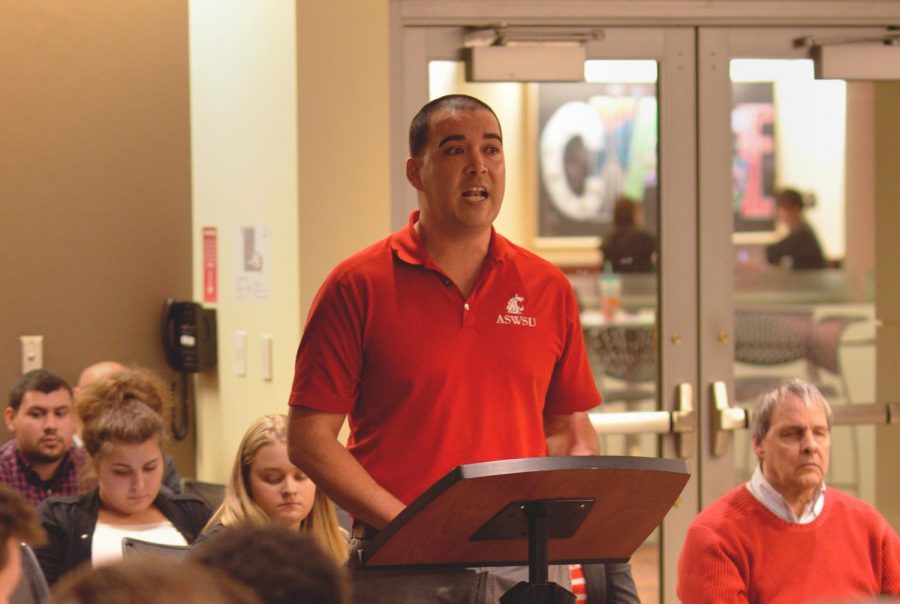Retention counselors have important role
Renewing retention counselor contracts will advance university diversity efforts, support student interests
ANDREW LANG | Daily Evergreen File
Rafael Pruneda, a WSU retention counselor, speaks at an ASWSU meeting during which a resolution to make WSU a sanctuary campus was discussed Feb. 22.
October 31, 2017
Multiple multicultural retention counselors will see their contracts expire without renewal in order to meet the university-wide budget cuts proposed by WSU’s current administration. This is a disservice to WSU’s multicultural students and must be prevented.
In August, WSU President Kirk Schulz made a commitment to make all WSU campuses safe and inclusive. The inaction we’ve seen regarding white supremacy issues on this campus, as well as the cutting of funds to multicultural services like these retention counselors, is in direct conflict with his statements.
The Office of Multicultural Student Services is already so small that the effects of the proposed cuts will have an insignificant effect on WSU’s budget. The effects on students, however, will be much larger and longer lasting.
Rafael Pruneda is a retention counselor and adviser for the Chicana/o Latina/o Student Center. In December, he’ll see his contract expire and the center will be left with only one retention counselor for about 2,800 Chicanx and Latinx students. In addition to mentoring, organizing programming and advising first-generation study-abroad students, Pruneda also has an open-door policy for any student who needs someone to talk to.
“For me, it’s been a great joy to have that impact on students that really need you to be there for them in a very vulnerable time,” Pruneda said. “If there’s no one there to help you, then you might walk away from what you need to get off your chest.”
Students have come to Pruneda with problems, such as family emergencies or sexual assault.
“It’s not all academic. I think that is a big piece of it, but then there’s a lot of emotional issues that come with it, too, because I think our first-generation students are very fragile,” Pruneda said. “A lot of them have family members that are supportive, but that’s all they can do — support them from home. They’re here on their own.”
Students need advisers and mentors that they can relate to. It’s not enough for WSU to have a one-size-fits-all attitude for encouragement. Students need to be able to see someone who has a similar background and went through the same struggles that they’re going through in order to see that it’s possible to persevere.
“I’ve been academically deficient and then I’ve been on the president’s list,” Pruneda said. “I’ve dealt with losing a parent and then also being financially unstable. So I think all those experiences have been able to help me resonate and connect with a lot of these first-generation students.”
On top of all of the work Pruneda is doing, he is also an adviser for a multicultural fraternity. While he noted that Latino men in particular are struggling in Pullman’s current environment, he was able to work with them to improve his brotherhood’s average GPA from 2.4 to 2.8 in a single semester.
It is people like Pruneda who we risk losing if the administration continues with its proposed budget cuts. While cuts need to happen, retention counselors are too important. Losing them will disproportionately affect the already underserved communities here at WSU.
In order to continue the support for these students, the funding for the new associate vice president for community, equity and inclusive excellence should instead be allocated to the Office of Multicultural Student Services so retention counselors are not let go. While this new position is supposed to help usher in institutional change, historically, change does not come from within administrations. It comes from groups of lower-level employees and students banding together and forcing the administration to recognize a need for it.
It is not this administration’s fault that WSU’s deficit is so out of control; that has come from years of mismanagement. It is, however, this administration’s responsibility to reorganize the budget so that students do not lose programs necessary for their success. In this way, the administration has failed.









